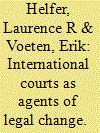| Srl | Item |
| 1 |
ID:
131486


|
|
|
|
|
| Publication |
2014.
|
| Summary/Abstract |
Do international court judgments influence the behavior of actors other than the parties to a dispute? Are international courts agents of policy change or do their judgments merely reflect evolving social and political trends? We develop a theory that specifies the conditions under which international courts can use their interpretive discretion to have system-wide effects. We examine the theory in the context of European Court of Human Rights (ECtHR) rulings on lesbian, gay, bisexual, and transgender (LGBT) issues by creating a new data set that matches these rulings with laws in all Council of Europe (CoE) member states. We also collect data on LGBT policies unaffected by ECtHR judgments to control for the confounding effect of evolving trends in national policies. We find that ECtHR judgments against one country substantially increase the probability of national-level policy change across Europe. The marginal effects of the judgments are especially high where public acceptance of sexual minorities is low, but where national courts can rely on ECtHR precedents to invalidate domestic laws or where the government in power is not ideologically opposed to LGBT equality. We conclude by exploring the implications of our findings for other international courts.
|
|
|
|
|
|
|
|
|
|
|
|
|
|
|
|
| 2 |
ID:
168543


|
|
|
|
|
| Summary/Abstract |
Enforcement of international law is often delegated to national courts, creating a space for them to play a part in international judicialization. Under what conditions can they do so? We argue that the answer depends on the relationship between the political and legal constraints national courts face. National courts must be careful to safeguard their independence in the face of potential backlash, but they face constraints in terms of the legal mechanisms available to them when enforcing international law. We focus on the availability of two legal mechanisms: direct effect, under which courts apply treaties directly, setting aside inconsistent domestic laws; and canons of interpretation, under which courts strive to interpret domestic laws in conformity with treaties. We find that the effects of human rights treaty ratification is greater when courts have the canon available to them than it is when courts have direct effect available to them.
|
|
|
|
|
|
|
|
|
|
|
|
|
|
|
|
| 3 |
ID:
133974


|
|
|
|
|
| Publication |
2014.
|
| Summary/Abstract |
This article explores the conceptual relationship between trafficking in human beings, enslavement and crimes against humanity. The analysis of case law of the International Criminal Tribunal for the Former Yugoslavia and the European Court on Human Rights reveals that, while trafficking in human beings and enslavement are increasingly overlapping, they still do not coincide. Moreover, enslavement is only a crime against humanity if it is committed in a widespread or systematic manner by an organization which displays State-like features. In the opinion of the author, the qualification of human trafficking as "modern slavery" is therefore confusing. The fact that human trafficking covers a wide array of offences influences the choice of forum in respect of criminal law enforcement. While enslavement as a crime against humanity may belong to the jurisdictional realm of international criminal tribunals and the International Criminal Court (provided that domestic jurisdictions have proved to be "unwilling" or "unable"), other forms of human trafficking are, in the view of the author, best left to national courts.
|
|
|
|
|
|
|
|
|
|
|
|
|
|
|
|